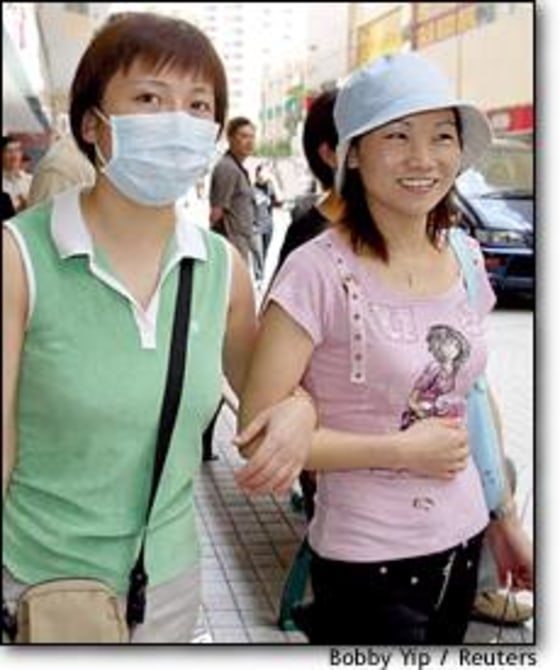Take the tram up to one of Hong Kong’s most famous tourist attractions these days, and you won’t have to wait in line for a ticket to board the territory’s oldest form of transportation. You can have just about any seat you want.
The first thing you’ll notice is that the ticket sellers, the tram conductor and the driver all still wear protective masks to protect themselves — and you — from SARS. Once at the top of Victoria peak, the haze may be a bit of a problem this time of year, but there will be hardly any tourists there blocking the majestic view.
Nick Cadwallader, a British businessmen, was one of the few westerners taking in the sights last week. “I’ve been here several times before and sometimes you can’t move up here for the people,” he said.
Even though SARS, or severe acute respiratory syndrome, has been disappearing from Hong Kong — the World Health Organization on Monday — the tourists and business people who used to flock here, making Hong Kong one of Asia’s most vibrant crossroads, are still staying away.
Meanwhile, the local economy has been reeling. Unemployment recently hit a record high of 8.3 percent. Contact just about any hotel in the city, and even the top-end establishments are willing to make a deal for your dollars. Occupancy is way down. The glitzy stores in Hong Kong’s ubiquitous shopping malls are slashing prices.
The SARS outbreak may be over, but the recovery has yet to take hold.
HONG KONG ‘HYSTERIA’
“We’ve had hysteria locally, and we’ve had hysteria overseas,” said Mike Rowse of InvestHK, a man with perhaps the most challenging job in the territory: selling Hong Kong to the outside world.
Armed with a billion-dollar budget, and a sense of humor to rival any amateur stand-up comic, he sticks to a simple message when asked of Hong Kong is safe. “Yes it is, its absolutely safe,” he says, his voice filled with conviction. “For the ordinary visitor coming to Hong Kong for business or leisure, Hong Kong is perfectly safe — one of the safest cities in the world,” he adds, ending his sales pitch.
Rowse is planning a series of high-profile sports and entertainment events to lure visitors back. For now, until the deals are signed, he’s keeping details of all of that close to his chest.
Rowse says the first part of his job during the past few weeks, was to convince the people who live and work in Hong Kong that the territory is safe. Only a smattering of people still wear protective face masks these days, perhaps the most obvious sign the message is getting through. Hundreds of thousands of masked faces used to prowl Hong Kong’s streets and few people dared to venture into crowded areas.
Unfortunately, or fortunately, depending on how ones looks at this, most masked Hong Kongers now are people who come face-to-face with the general public.
Taxi drivers, store keepers, some hotel staff, and of course those tram operators, often still wear masks. While they’re only trying to protect themselves, the impression the masks give a leery visitor can be alarming.
UNKNOWN THREAT
Hong Kong’s health officials say they are doing everything they can to erase the mystery and fear still associated with this illness, which no one had ever heard of just a few months ago. Public service announcements on TV urge everyone to wash their hands frequently, keep things tidy, and live a healthy and hygienic lifestyle. Dispensers filled with anti-bacterial sprays have been installed in government buildings and other busy areas around town.
Even though it’s still unclear exactly where SARS came from — there’s no vaccine to prevent it, no cure likely anytime soon — Hong Kong health officials insist they’re doing everything possible to contain the illness and prevent a new outbreak, such as the one that occurred in Toronto after that city was removed from the WHO’s list of SARS-affected areas.
“We are in a much better position now because we understand a bit more about SARS than we did in March,” insisted Secretary of Health, Welfare and Food Dr. Yeoh Eng-kiong. “We have a whole series of public health measures that will enable us both to detect and contain it.”
STRICT MEASURES
Hong Kong’s key defense mechanism is screening for high fever, an early symptom of SARS. At a recent jewelry trade fair, high-tech scanning devices checked everyone’s temperature as they entered the convention center. That fair was one of the largest international gatherings in the territory in months, a sign that fears overseas of coming to Hong Kong may be starting to ease.
Health workers also screen passengers at Hong Kong’s airport and other border crossings. Just about everyone entering and leaving has a thermometer stuck in their ear. WHO officials are urging vigilance for some time to come.
“The surveillance has to go on for at least a year,” said David Heymann, the WHO executive director of communicable diseases, during a recent stop in Hong Kong. “Nobody knows whether its over or not, here or anywhere else.”
Heymann and other disease experts worry that SARS may be a seasonal disease that could return a year from now. And there’s also concern that some people infected with SARS, but who have no obvious symptoms, still could be spreading the disease.
For now, Hong Kong insists it has a clean bill of health. But if the territory is to overcome the fear and stigma that goes with SARS, officials say they still must convince the outside world enough of the mystery has been solved.
NBC’s Ron Allen is on assignment in Hong Kong.
